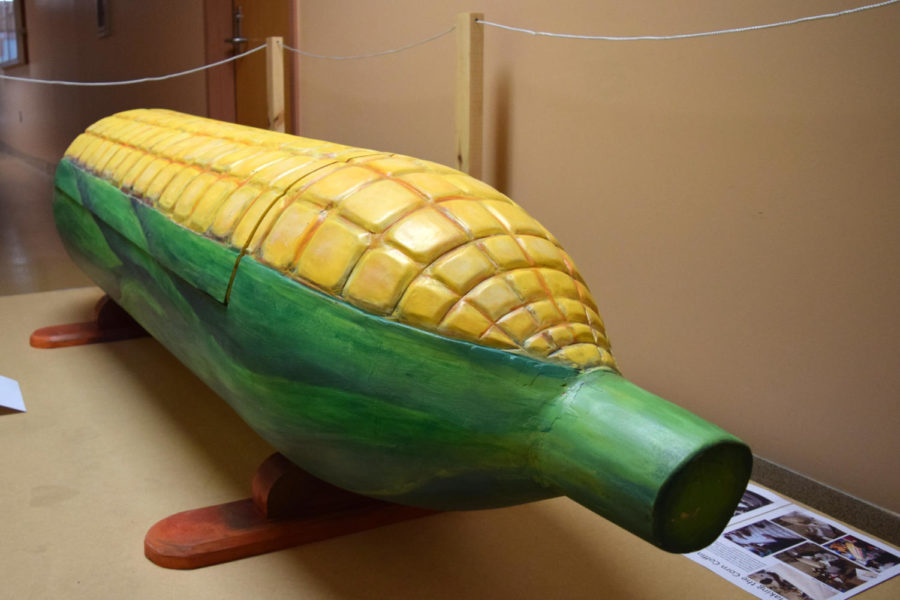ISU design students help fund Ghana village
April 20, 2015
Students from Iowa State’s College of Design have the opportunity to make a difference in a small village in Ghana, Africa by doing what they do best — creating art.
The ISU chapter of Engineers Without Borders is auctioning a folk art coffin in order to fund a dam in Ullo, a village of Ghana.
Chris Martin’s students and Eric Adjetey Anang, an artist from Ghana, helped create the coffin. Martin is an associate professor of art and visual culture.
Anang visited Martin’s furniture and wood design classes to help ISU students make the corn-shaped fantasy coffin.
Martin said the folk art coffins are unique to Anang’s village in Ghana.
“Ghana is well known for their art,” Martin said. “Every village specializes in special craft. So where [Anang] lives, there’s all kinds of fantasy coffin makers there. In another village, it’ll be all glass bead makers and so on.”
Martin, along with his wife Tammi, had the opportunity to see the unique art in Ghana after joining the Peace Corps and living in the region for two years before returning in 2010.
In 2012, Martin connected with friends from Peace Corps and his wife in Ullo, which is located in northwest Ghana. Martin said he decided to help the village there and reached out to Iowa State’s chapter of Engineers Without Borders.
The Engineers Without Borders soon adopted the village. After a visit, the chapter saw Ullo needed a water distribution system and decided to build the dam.
Martin said he decided to use the folk art coffin in order to help fund the dam in Ullo.
“That was the intention from the get-go,” Martin said. “I thought ‘we’re going to make this coffin, and what’s going to happen with it?’ So I thought this was perfect.”
Anang came to the United States in September and spent a little more than a week in Iowa. During that time, the artist helped ISU design students create the fantasy coffin.
Caroline Freese, senior in integrated studio arts, had the opportunity to work with Anang during his visit last semester.
Freese said Anang taught her more rustic ways of using power tools because they don’t have the same resources we have in the United States.
“He helped give me confidence in using power tools and working on the very large complex coffin because he didn’t judge me or any other girls in the class based on our gender,” Freese said. “We were expected to perform as well as the men in the class, which is something that I value to this day.”
Freese said the project as a whole was a great way to start out the academic year because she made lots of friends working on it, including Anang.
The finished coffin will be auctioned off on eBay on April 20 to 30. The bidding starts at $500.
Martin said all of the proceeds from the auction will go toward getting the students there and working on the project.
“Technically, it’s Ghanans helping Ghanans in the bigger picture because [Anang] contributed as much if not more than we are,” Martin said.
Martin said he will return to Ghana during Winter Break with 12 design students for three weeks. There, they will visit craft villages and work with local artists, including Anang in his studio. They will also spend a week at Our Gifted Hands, a school that trains deaf people how to do craft work.
Students from Engineers Without Borders will visit Ghana during that time as well to gather data and finalize plans for the dam.
Freese will be among the 12 design students visiting the country and said she is very excited to go and hopes she will gain international experience.
“I have never been to a country in Africa, so this experience will be more challenging and different,” Freese said. “I also hope to gain experience with different media and different practices in executing art that will be very valuable to my future career.”
To learn more or find out how to bid, visit http://ewbisu.org/coffin.







